 Should we really be surprised that the league’s most interesting general manager chose to take the path of higher risk, higher reward?
Should we really be surprised that the league’s most interesting general manager chose to take the path of higher risk, higher reward?
That’s where the Houston Rockets, led by daring and analytically driven GM Daryl Morey, enter the 2014-15 season.
When we last saw them, contention didn’t feel far away. In the first year of the Dwight Howard-James Harden foundation, the Rockets went 54-28 in a loaded West and secured home court advantage in the first round. That was in line with preseason expectations, when most around the NBA were bullish on Houston’s future. After all, they may have the league’s best center and shooting guard.
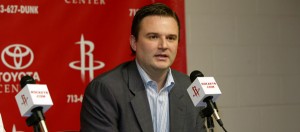 From there, they lost a coin-flip series to one of the West’s “Big Five” teams when Damian Lillard’s Game 6 buzzer-beater in Portland splashed in. It was heartbreaking for Houston, but few expected to win a title in the first year of the Howard-Harden partnership, anyway. They remained on an upward trajectory and within minor additions of contending. When the 2013-14 Rockets cleaned out their Toyota Center lockers in May, few expected major changes.
From there, they lost a coin-flip series to one of the West’s “Big Five” teams when Damian Lillard’s Game 6 buzzer-beater in Portland splashed in. It was heartbreaking for Houston, but few expected to win a title in the first year of the Howard-Harden partnership, anyway. They remained on an upward trajectory and within minor additions of contending. When the 2013-14 Rockets cleaned out their Toyota Center lockers in May, few expected major changes.
Everyone knew Morey would pursue big free agents like Carmelo Anthony and Chris Bosh, but those were inherently long shots. The smart money seemed to be on retaining the core of last season’s team, including young small forward Chandler Parsons, and using free agency to address depth issues that plagued the team. To their credit, they did that to an extent with the additions of Jason Terry, Kostas Papanikolaou, Jeff Adrien and others.
The Rockets could’ve made all those moves, kept Parsons and still added Trevor Ariza, giving them a team comprised of two elite players in Harden and Howard and a deep supporting cast including Parsons, Ariza, Pat Beverley, Terrence Jones and more.
The downside, though, was that they would’ve had zero salary-cap flexibility going forward. They would’ve been locked into that team, sink or swim. So when the time came to make a decision on Parsons, Morey decided the potential of the unknown trumped the certainty of the present.
“We are in a better [place] to win a championship by not matching it,” Morey said. “The question is actually: is Harden, Howard and Parsons, do those three give better championship odds than Harden, Howard and the team we can put together. In our opinion, it was not close.”
As a result, instead of adding to depth, Ariza is replacing Parsons at small forward. Even with two stars, the Rockets remain in a state of transition as they wait to see what “flexibility” will lead to.
They’re still a playoff team, perhaps even remaining in the West’s upper half. But whether Houston is a serious contender hinges on several unknowns, such as these five things:
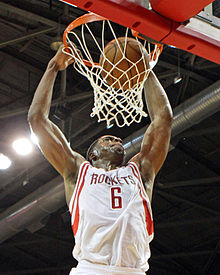 1. Is Terrence Jones the answer at power forward? Many are high on the third-year power forward from Kentucky, and with good reason. At 6-9 and 250 pounds, he is long, wiry and athletic, and in some ways an ideal complement to Howard. Jones is great in transition. He gets garbage points off loose balls and finishes well when others draw double-teams. He is efficient (PER of 19.0 in 2013-14) and at times has shown the ability to space the floor (30 percent threes).
1. Is Terrence Jones the answer at power forward? Many are high on the third-year power forward from Kentucky, and with good reason. At 6-9 and 250 pounds, he is long, wiry and athletic, and in some ways an ideal complement to Howard. Jones is great in transition. He gets garbage points off loose balls and finishes well when others draw double-teams. He is efficient (PER of 19.0 in 2013-14) and at times has shown the ability to space the floor (30 percent threes).
But the theme of the 2014-15 Rockets seems to be toughness. Coach Kevin McHale emphasized defense and rebounding repeatedly during camp as traits he is looking for, and Jones was sorely deficient in those fundamental areas a season ago. Jones was entirely too light to defend LaMarcus Aldridge when the Rockets met Portland in the postseason, thereby forcing the Rockets to shift Howard onto Aldridge and losing much of Howard’s value as a rim protector. Jones worked in the offseason to bulk up, but it remains to be seen if he’s added enough – and if he did, did he do it without compromising the agility that makes him such a unique weapon on offense?
There aren’t clear answers behind Jones, either. Seven-footer Donatas Motiejunas shows flashes, especially on offense, where he is a tremendous passer and cutter. But like Jones, Motiejunas has his warts. He still hasn’t developed a consistent perimeter jumper, and on defense, he struggles to move well laterally and often gets into foul trouble. Adrien was a savvy pickup in free agency from Milwaukee, but at 6-7, he’s probably not long enough to be a starter on a contender.
McHale says the power forward job is open for competition. But realistically, it’s Jones’ to lose. The real question is if Jones can show enough early in the season to make the Rockets prioritize another position for their inevitable big move.
 2. Is Trevor Ariza’s improved shot for real? Though he’s now considered a strong “3 and D” small forward, Ariza used to only provide part of that. In his first eight seasons, one of which was in Houston, Ariza never shot higher than 33.4 percent from the arc. But that number surged to 36.4 percent in 2012-13 and exploded to 40.7 percent last season in Washington, a mark that made him an elite shooter.
2. Is Trevor Ariza’s improved shot for real? Though he’s now considered a strong “3 and D” small forward, Ariza used to only provide part of that. In his first eight seasons, one of which was in Houston, Ariza never shot higher than 33.4 percent from the arc. But that number surged to 36.4 percent in 2012-13 and exploded to 40.7 percent last season in Washington, a mark that made him an elite shooter.
But is it sustainable? Ariza says he has made changes to his form, and considering his improvement occurred gradually over two years, it would appear more than a temporary streak. If so, it could be that Ariza fits better than Parsons. Unlike his predecessor, a notoriously bad defender, Ariza has long been considered a defensive stalwart – which could make him a better complement to Harden.
Ariza isn’t the creator off the dribble that Parsons is, but for a team with Howard and Harden, that isn’t a huge need. What the Rockets need most next to them is steady defense and range shooting. Ariza will definitely provide the former, but the latter will tell the tale on whether he is an upgrade.
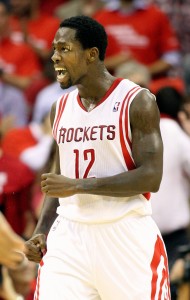 3. What is Patrick Beverley’s ceiling? Beverley displaced Jeremy Lin as Houston’s starting point guard before 2013-14, but the Rockets depended on both throughout the season. Beverley brought energy and defense, which made him a better fit alongside the starters, while Lin offered more ability to create his own offense. Although Lin didn’t start, he did still average 29 minutes. Now that Lin is a Laker, it’s a substantial hole to fill.
3. What is Patrick Beverley’s ceiling? Beverley displaced Jeremy Lin as Houston’s starting point guard before 2013-14, but the Rockets depended on both throughout the season. Beverley brought energy and defense, which made him a better fit alongside the starters, while Lin offered more ability to create his own offense. Although Lin didn’t start, he did still average 29 minutes. Now that Lin is a Laker, it’s a substantial hole to fill.
Lin’s backup role will likely be divided between Terry, Isaiah Canaan and rookie Nick Johnson, but what the Rockets really need is for Beverley to successfully take on a larger workload. Beverley said this offseason that he believes he can bring more to the table offensively and be a creator, rather than just a spot-up shooter.
Perhaps the best part for Houston is that Beverley has every financial incentive to make it happen. He’s set to become a restricted free agent after the season, and he plays a deep position. If Beverley wants a big payday next summer, he needs to be a more complete player. With Lin gone, the Rockets will give him every opportunity to show that he is.
4. Can James Harden be a capable defender? You’ve heard the jokes and seen the Vines. Harden was a terrible defender a season ago, and it’s tough to imagine a championship leader putting in no effort on one side of the floor.
The upside is that Harden knows it and takes responsibility. “I know at times my defense is pretty bad,” he said. “I have to be better. I have to be great on both ends.”
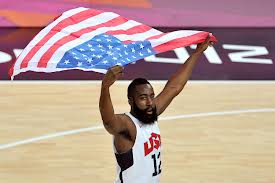 The Rockets saw this summer that he could be. He wasn’t perfect, but Harden’s defensive lapses on Team USA were much reduced. Harden credited the legendary coaches on the U.S. national team, led by Duke’s Mike Krzyzewski and Chicago’s Tom Thibodeau, with helping his development. “The coaches were unbelievable,” said the 25-year-old Harden, who despite his defensive deficiencies was an All-NBA First Team selection in 2013-14. “It’s not the fact that I can’t do it. I know I can be a really good defender. It’s about the focus and small things that I kind of lose track of.”
The Rockets saw this summer that he could be. He wasn’t perfect, but Harden’s defensive lapses on Team USA were much reduced. Harden credited the legendary coaches on the U.S. national team, led by Duke’s Mike Krzyzewski and Chicago’s Tom Thibodeau, with helping his development. “The coaches were unbelievable,” said the 25-year-old Harden, who despite his defensive deficiencies was an All-NBA First Team selection in 2013-14. “It’s not the fact that I can’t do it. I know I can be a really good defender. It’s about the focus and small things that I kind of lose track of.”
All eyes are on Harden now, especially with many observers taking a pessimistic view of Houston after losing Parsons. If the Rockets want to counter that narrative, the easiest way to find internal improvement is by Harden lifting his defensive effort to a respectable level.
If he doesn’t, it could spell doom for McHale. The coach has a great relationship with Morey, but he is in the last year of his contract and has yet to win a playoff series in Houston. If McHale can’t drive the type of defensive commitment from Harden that the U.S. coaches did, it’s easy to see McHale taking the fall if the 2014-15 Rockets disappoint.
RELATED: Rockets salaries and analysis
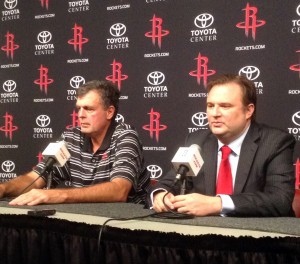 5. Does Daryl Morey make a big move by the trade deadline? The Rockets have coveted assets. They traded Omer Asik for an almost-guaranteed lottery pick from the Pelicans, much like the 2012 trade of Kyle Lowry to Toronto for the pick that was centerpiece of the eventual Harden deal. They have young pieces like Jones and Papanikolaou on cheap, short-term contracts. They have a mid-sized expiring salary in Terry to make salary math work and enable other teams to clear cap. They obtained a traded-player exception (TPE) of roughly $8 million in sending Lin to the Lakers.
5. Does Daryl Morey make a big move by the trade deadline? The Rockets have coveted assets. They traded Omer Asik for an almost-guaranteed lottery pick from the Pelicans, much like the 2012 trade of Kyle Lowry to Toronto for the pick that was centerpiece of the eventual Harden deal. They have young pieces like Jones and Papanikolaou on cheap, short-term contracts. They have a mid-sized expiring salary in Terry to make salary math work and enable other teams to clear cap. They obtained a traded-player exception (TPE) of roughly $8 million in sending Lin to the Lakers.
The question is whether there’s an in-season deal worth surrendering those assets. The ideal scenario is if someone like Bosh comes available, but the most popular rumored names aren’t at that level. So it may come down to contracts. Houston liked Parsons a lot, evidenced by Morey offering him a max deal over two seasons. But when the Dallas offer came along with a player option after Year 2, a 15 percent trade kicker and related landmines, the Rockets balked at matching because Morey viewed it as “one of the most untradeable contract structures” he had seen. In short, should someone like Kevin Durant in 2016 show interest in Houston, the Rockets want the flexibility to have contracts they can move.
In the meantime, they will evaluate additions through the prism of whether the player would have positive trade value moving forward. Morey deduced that Parsons would not had he matched the offer sheet, so he passed. But that doesn’t mean Morey is going to be quiet until free agency. Atlanta’s Paul Millsap is a power forward with range on a reasonable (and expiring) contract. Another is Indiana’s David West, although he has a player option for an extra year. These are types of players that might interest Morey. Should Jones prove capable enough as a starter, Morey may instead target point guards with tenuous contract situations such as Rajon Rondo or Ricky Rubio.
If the Rockets can pull off one of those moves during the season, they will be a legitimate contender come May. But that’s a big if. NBA GMs have tended lately to make bigger moves over the summer, making the in-season market for premium targets more challenging.
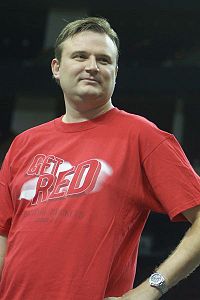 For now, Houston enters this season with perhaps two of the top 10 players in the league but awaiting another move to firmly make the leap into contention. With Harden and Howard in place, the vast majority of the league’s GMs would have gone the conventional route and allowed a young cast to continue to grow organically around its two stars.
For now, Houston enters this season with perhaps two of the top 10 players in the league but awaiting another move to firmly make the leap into contention. With Harden and Howard in place, the vast majority of the league’s GMs would have gone the conventional route and allowed a young cast to continue to grow organically around its two stars.
But Morey, as we all know, is quite unconventional. That’s the approach that led him to Harden and Howard, and he thinks it will eventually work in his favor again.
“We’re going to continue to have opportunities this season and potentially in the future to add a significant player,” Morey said. “We felt like the bet on what we could do with our picks and cap room was better than locking into that core [with Parsons].”
In the big picture, Morey is likely right. But for now, there’s a season to be played in the prime of Howard and Harden’s careers – and whether Houston can fully take advantage depends on whether those “opportunities” come this year or further down the road.
We’ll have more answers by late February. For now, stay tuned.
WILL THE ROCKETS WIN 50 AGAIN THIS SEASON? SEE WHAT SHERIDAN SAYS
READ EVERY TEAM’S SEASON PREVIEW WITH OUR INDEX
Ben DuBose is a veteran sports reporter who has followed the Houston Rockets and the NBA since Hakeem Olajuwon was Akeem Olajuwon. He writes for SheridanHoops and ClutchFans, an independent Rockets blog. You can follow him on Twitter.
